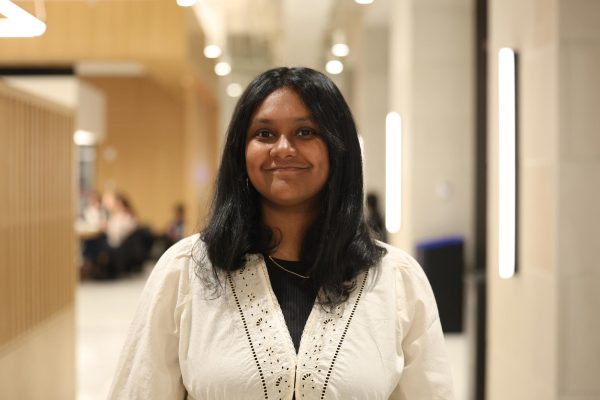Fordham Law School hosted “A Conversation on Race and Slavery at Fordham” on April 14. The day-long event took place in Constantino Hall and featured speakers both from and outside of Fordham.
Aysha Ames, director of legal writing at Fordham Law School, and Dr. Jeannine Hill Fletcher, professor of theology, have each been researching university ties to enslavement for over a decade. They have requested a task force from the university to study ties to enslavement at Fordham.
Jelani Cobb, Ph.D., Columbia Journalism School dean and a staff writer for The New Yorker, was the event’s keynote speaker. In his talk, Cobb highlighted the ways that collegiate institutions and states across the country have been premised and founded upon histories of slavery. He stressed the importance of the work that Ames and Fletcherhad begun and emphasized that it is important to protect the faculty and administrators carrying out the work.
“Redemption begins with the unflinching willingness to look history in its face and assert the truth even when it makes us look bad, even when it opens us up to criticism, even when it highlights the ways that we have fallen short of our ideals,” Cobb said.
Ames and Fletcher delivered their joint panel next, titled “Fordham’s Ties to Enslavement.” The pair have been researching Fordham’s ties separately for over a decade, but began researching together over a year ago.
The pair noted that Fordham’s official position is that no ties to enslavement exist on Fordham’s campus. They cited a 2017 statement in which Bob Howe, Fordham’s associate vice president for media and public relations, said that after a few months, a research team determined that no direct connection to slavery was present.
Fletcher and Ames began their talk with the three dates and institutions etched in Keating Hall: St. Mary’s Maryland, 1634; Fordham, 1841 and St. Mary’s Kentucky, 1831. According to Ames’ and Fletcher’s presentation materials, “Early Jesuit faculty and administrators at St. John’s Fordham moved through the network of Jesuit institutions throughout the north, south, and west … At times, individual Jesuits served at these institutions and subsequently returned to St. John’s Fordham.”
They also noted that Archbishop John Hughes, founder of St. John’s Fordham, was an open anti-abolitionist and worked as an overseer of enslaved people before entering the seminary. According to talk materials, “as Archbishop, Hughes publicly preached that slavery was consistent with Catholic teaching, reasoning that the power of slavers over enslaved people was rooted in the power of God. Hughes maintained and disseminated antiabolitionist views, which further informed broader Catholic sentiment.”
The third panel of the day was titled “The Jesuit Network and Slavery” and featured Monique Trusclair Maddox, CEO of Descendants Truth & Reconciliation Foundation and a descendant of Jackson Hawkins, and Father Timothy Kesicki, S.J., Chair of the Descendants Truth & Reconciliation Trust. Ames moderated the panel. Maddox’s family was enslaved by the Jesuits, and Kesicki learned about the Jesuit connections to enslavement via a 2016 New York Times article that detailed the Georgetown slave sale.
When asked by Ames why it was important to them to make sure this story is told now, Maddox responded that descendants weren’t going anywhere. She also said that companionship in this journey keeps her going.
“Descendants have been seen. You’ve been seen, Aysha, I’ve been seen. And there are other descendants in the audience that have been seen. We will not let this history go away again. There is nothing that is going to stop us from telling our story,” Maddox said.
“In this climate today, the work that we do as a part of the Descendant’s Truth and Reconciliation Foundation is bigger than what anyone could ever do because we are not only helping descendants through our work, but we’re also helping, on what started out on a national scale, with helping root out systemic racism in this country through our truth, racial healing and reconciliation programs, but we’ve also begun to do that on a global scale as well,” Maddox continued.
Stephen Louis, a law student at Columbia University, said that he heard about the event when he saw a poster at Fordham Law School. He attended the third panel and said that he thinks restorative justice is a good starting point for these conversations.
“If it wasn’t at all a conversation, I would be disheartened, right? But the fact that it’s starting somewhere, I feel like over time there’s going to be a trickle-down effect,” Louis said. “Fordham doesn’t even acknowledge it [the university’s ties to slavery] yet. Hopefully, this can be, I would say, a fire under Fordham to start the conversation and address it.”





































































































































































































